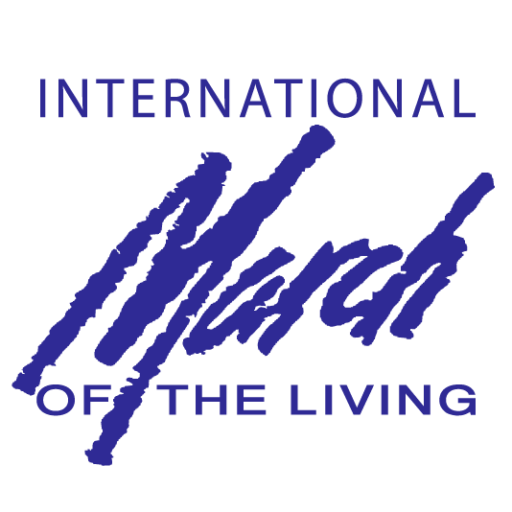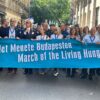-
-
Satirical Slap in the Face
By: The Israel Opinion Op-ed: New German film ‘Look Who’s Back,’ which satirizes Hitler, should not have been made for same reasons Charlie Chaplin regretted making ‘The…
Continue reading -
Is It Kosher to Invoke the Shoah in Politics
By: Jodie Shupac, Canadian Jewish News The recent backlash against York Centre Conservative MP Mark Adler for noting in campaign literature and on his website that he’s the son of…
Continue reading -
The secrets of Ukraine’s shameful ‘Holocaust of Bullets’ killing centre where 1.6million Jews were executed
Please note, this is a text only version. To read the article with archival photographs (many of which contain graphic content), click here. The Daily Mail, By Will…
Continue reading -
Holocaust survivors’ grandchildren call for action over inherited trauma
The Guardian, By Jean West Jewish activists in Scotland have started a campaign to support the grandchildren of Holocaust survivors across the world, saying the trauma of the extermination camps…
Continue reading -
In Poland, Searching for Jewish Heritage
New York Times, By Joseph Berger A writer and his sister journey to the childhood homes of their parents, places where once Jews like them could thrive. When I was growing…
Continue reading -
European Maccabi Games to be Held at Olympic Venues Built by Nazis
JTA By Toby Axelrod BERLIN (JTA) – They are roaring through Europe, raising dust as they go: Jewish bikers bearing an Olympic-style torch all the way from Israel to this German city. Next week, 11 core riders will pull their steel steeds into Berlin’s famous outdoor amphitheater, the Waldbuehne, to help usher in the 14th European Maccabi Games — the first ever in Germany — at a venue built by the Nazis for the 1936 Olympics. Other competitions will be held at the Olympic Stadium here, where Hitler presided over the opening of the games that year. Adolf Hitler, second from left, watching the Olympic Games in Berlin with the Italian crown prince, left, August 1936. (Fox Photos/Getty Images) The riders are following in the treads of the Maccabiah Riders, who rode through Europe in the early 1930s to promote the games then being held under British mandate in Palestine. The July 28 opening ceremony, which will feature remarks by German President Joachim Gauck and a concert featuring Matisyahu, Dana International and others, will usher in 10 days of sports, parties, a Limmud Germany learning event and more. Some 2,300 Jewish athletes from 36 countries will take part, cheered on by fans bused in from across the country by the Central Council of Jews in Germany. And the sports venues, including Berlin’s Olympiastadion, will be open to all, free of charge and under heavy security. Elen Katz and Catherine Lurie-Alt participating in a motorcycle rally from Israel to Berlin for the opening of the European Maccabi Games. (Yosef Alony) Athletes will compete in 19 sports, as well as a few exhibition games pitting Jewish athletes against German soccer and basketball stars. On July 31, they will try to break the Guinness World Record for the largest kiddush ever. The European Maccabi Games grew out of the Maccabi movement, which traces back more than a century to Turkey when Jews, then shut out of local sporting clubs, founded the Israel Gymnastic Club in 1895. Jews elsewhere followed suit. Click HERE to continue reading.
Continue reading -
Our Secret Auschwitz
The New York Times By Rachel Sopher When I started therapy, I found it hard to speak. Sessions filled up with silences, pregnant pauses, missing words. I couldn’t express myself for fear that any divulgence would hurt someone I loved. My childhood home had been like this, too. Our quiet house on a quiet block in a quiet city brimmed with silence — not a peaceful silence, but a heavy pall. Because so little was said, the running dialogue in my head took on particular importance, keeping me company, a steady reminder to myself: I’m real, I’m alive, I exist. My grandfather often sat in the living room of our house, impassive and impenetrable, coming to life only to yell at one or another of us who had interrupted his television program. His yells, though terrifying, also came as a relief, the riddle of silence solved, at least momentarily. Something was wrong, but it was better not to ask. If I was silent, I couldn’t hurt anybody. Survival rested on an understanding that dialogue took place in different registers. The unspoken messages were the urgent ones, the ones that needed to be decoded. “Go clean your room,” my mother instructed out loud, while her expression said: I’m sad. I need to be alone. My therapist turned out to be a silent type, too, the kind who mostly listens and doesn’t answer direct questions. I spent a lot of time on her couch sitting in silence, wishing that the unending dialogue in my mind could be communicated by osmosis, implanted directly into her brain without words. It seemed that I could not break the family taboo against speaking what felt really real inside. Then one day I told my therapist a story from a time when I was 12 years old. I had gone to a Holocaust exhibit with my class, and when I got home my mom asked me, “How was school?” “Fine,” I said. “We went on a field trip to see an exhibit on Auschwitz.” “You know Grandpa was there, right?” she asked. “At the museum?” “No,” she said. “At Auschwitz. He was in the concentration camp during the war.” “Oh,” I said. No one had ever told me this. Still, my face flushed with shame at not knowing. I couldn’t think of anything else to say, and the conversation ended there. I absorbed the information as if just another fact, before returning to the safety of silence. When I told my therapist this story, I could sense her shifting in her chair. “What?” I asked her. “You know that the Holocaust was a huge trauma,” she said. “The kind that affects every life it touched.” “But it didn’t touch my life,” I protested. “That was my grandfather.” She didn’t respond to this, and we sat quietly until the session ended. But what she said stayed with me. In the next weeks, I attempted to have conversations with various family members about the impact of the Holocaust on our lives. But they were not interested in talking about it. The secret pact of silence was safer. Click HERE to read the full article.
Continue reading -
The Holocaust survivor who coached World Cup star Carli Lloyd
By Gabe Friedman July 7, 2015 12:01am JTA
Continue reading





